#travel hype
Text
Ok random thought, but it’s always weird to me when people say travelling is a life changing experience and maybe that’s bc I lived outside the us for a year as a child and have travelled all over the country.
Recently, I left the country for the first time in years and I kind of expected a fancy new experience but na. I already knew a lot of the history and culture of the country, and I loved the trip, especially getting to actually chat with random people. However, nothing about this was revelatory? It was cool and interesting, but people are just people? idk man
1 note
·
View note
Text

Happy new year my dearest uwu
Drawn for an exchange, but also so I can unapologetically draw edgy shit
Funky alt colors, line art under read more:
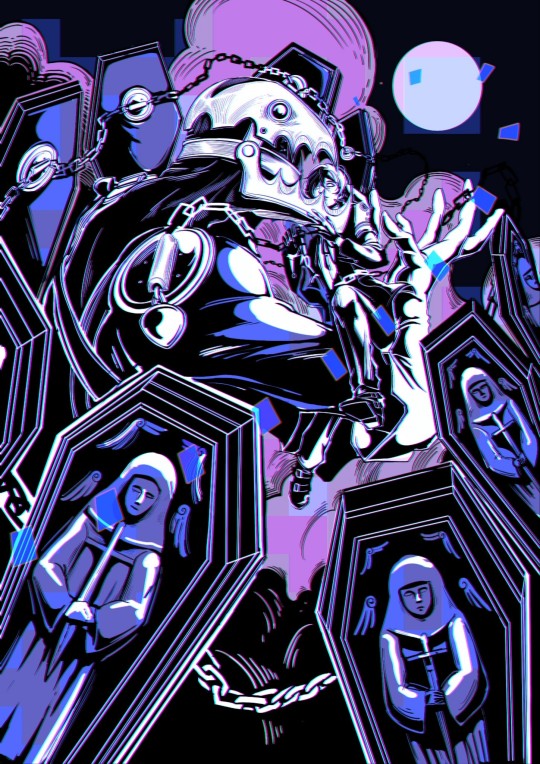

#persona 3#makoto yuki#minato arisato#p3#persona 3 reload hype#i know what you are#requester wanted male mc but i will draw hamuko soon#i drew most of this on the train coz ive been traveling alot so its a lil shakey#ryomina
803 notes
·
View notes
Text
it's all about the noises
bonus frames from the vid!



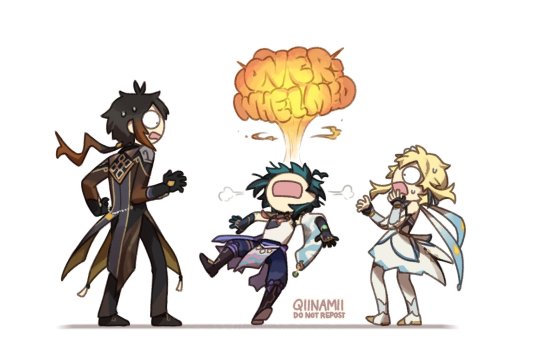
#qiiarts#animation#qiianimates#yo tf is that tag ok anyway#i've enjoyed making this at the high of the hype because xiao noises fuel my core#i set him at jp for years and waiting for two is worth the low guttural “naze omae ma de” cold anger to us he can slice me in half anytime#but he's also very skrungly! and will die immediately in a family dinner gathering#took me 3 days and my entire wrist i will do it again next time#xiao#lumine#traveler#paimon#zhongli#venti#some parts are. definitely missing but hey i already fixed it.......... not in the video <33333#genshin impact#forgot the gnsn tag pls dont maim me
727 notes
·
View notes
Photo
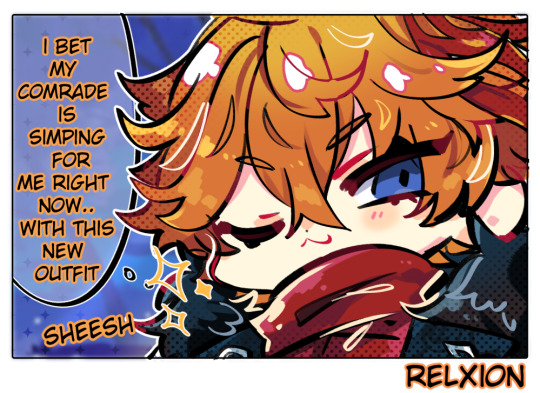
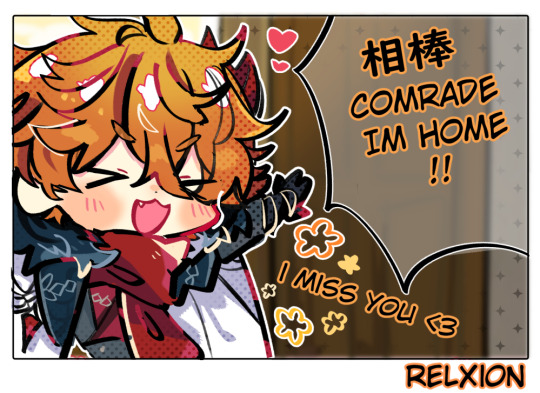
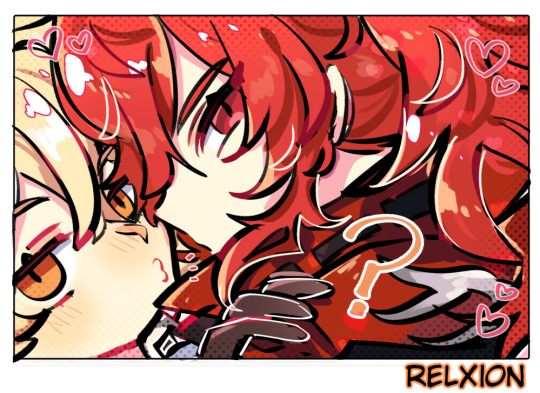

Wrong Server, Childe 🌊
#genshin impact#art#fanart#genshin impact diluc#diluc#diluc ragnvindr#diluc skin#tartaglia#childe#genshin impact tartaglia#genshin impact childe#ajax#aether#traveler#they not in relation or anything#i just bully childe cose i love him#he look hot#but diluc hotter im loyal stay focus im hype for diluc skin waooogooaaaa#diluc and childe is my main
4K notes
·
View notes
Text
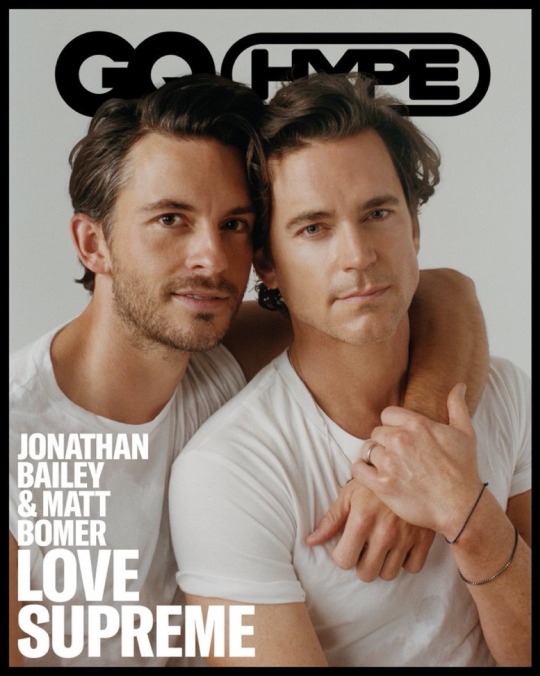
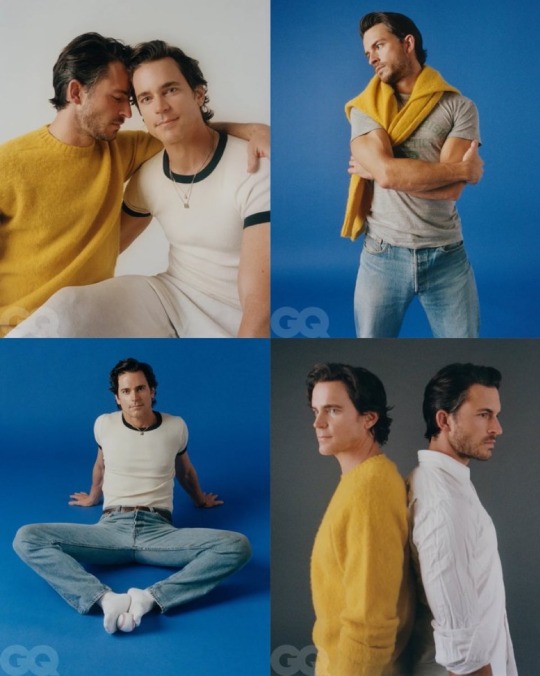
Matt Bomer and Jonathan Bailey for GQ Hype
105 notes
·
View notes
Text
Interview with Jonathan Bailey and Matt Bomer from GQ Hype
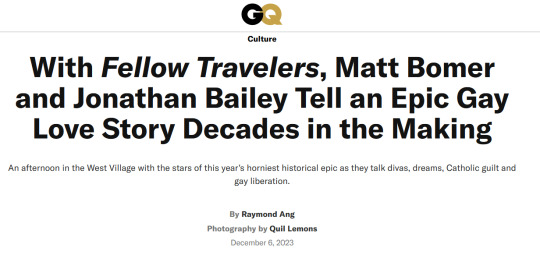
Filled with cozy, Hemingwayesque signifiers of midcentury masculinity (think: taxidermy and artfully-tattered boxing gloves), the restaurant seemed perfect for a breezy, late-autumn hang in the West Village.
But there’s one problem: Matt Bomer and Jonathan Bailey have burgers on their minds. And while this place boasts a surplus of dead animals nailed to the wall, it somehow only serves snacks and salads in the afternoon. And as Bomer points out, Corner Bistro—a pub that, in his opinion, serves some of the best burgers in town—is just a six-minute walk away.
The British-born Bailey—who, in his black sweater, floppy beanie and overstuffed backpack, looks more like a backpacker who just rolled out of his hostel rather than one of the streaming era’s top heartthrobs—waxes rhapsodic about In-N-Out, the California burger institution, which he recently tried for the first time.
He asks the suave, Old Hollywood-handsome Bomer, who spends most of his time in L.A. with his husband and three teenage sons, where In-N-Out falls on his personal burger index. “Our boys are really good judges of burgers,” Bomer says, and for them, In-N-Out is up there—but so is the burger at Corner Bistro. And how can we send Bailey—the Viscount of Bridgerton himself—back to London without tasting New York’s best?
Our location, midway between Stonewall Inn and Julius, two of New York’s most historic gay bars, is apt. The project we’re here to talk about—the epic new Showtime series Fellow Travelers, in which the pair star—tips its hat to the legendary 1969 riots that happened in Stonewall, but goes even further, telling the story of gay liberation in the second half of the twentieth century.
Part epic love story, part political thriller, Fellow Travelers begins in 1950s Washington, D.C., with an illicit affair between the strapping Hawkins “Hawk” Fuller (Bomer), a State Department official savvy to the ways of power, and the earnest, energetic Timothy “Tim” Laughlin (Bailey), the kind of wide-eyed idealist who goes to D.C. wanting to change the world. When they first meet, Tim is a conservative Catholic boy; his passionate, intensely erotic affair with Hawk both liberates him and throws him off his path.
Through the decades-spanning run of their relationship, the series takes us from the Lavender Scare of the 1950s—when a McCarthy-era policy that institutionalized homophobia expelled many “sexual deviants” from government, resulting at one point in a suicide a day—to the AIDS crisis of the 1980s.
The series is based on the Thomas Mallon novel of the same name. But where Mallon’s book generally focuses on the 1950s and the explosive romance between Hawk and Tim, the series expands the Fellow Travelers universe to reach through the decades and cover the Vietnam War protests of the '60s and the White Night riots of 1979.
“It's been taught that LGBTQIA+ history begins at Stonewall,” says Jelani Alladin, the actor who plays queer Black journalist Marcus Hooks in the series. “It’s a kind of false narrative. Queer people have been around taking a stand for themselves since the beginning of time.”
It feels like a disservice to call a series so sexy and so compelling as educational. But Fellow Travelers does serve as an important history lesson for younger generations who may not fully understand the battles fought before their time. “It was a really dark period in American history that obviously we're not taught in school,” says executive producer Robbie Rogers, who prior to his work in film and TV was the soccer player who became the first openly gay man to compete in a North American professional sports league. “We're not taught LGBT history.”
When the first episode of the series came out in late October, a viral clip showcasing Bailey and Bomer in a particularly kinky sex scene had Gay Twitter shuddering with excitement. In the scene, Bailey’s Tim uses his power as a sub to persuade Bomer’s Hawk to take him to an important D.C. party. “I’m your boy, right?” he tells Hawk. “Your boy wants to go to the party.” In surely one of this year’s hottest scenes on film or TV, we see Bailey hungrily suck on Bomer’s toes and gamely attempt to put his foot in his mouth. Earlier in the series, Hawk gives Tim the name “Skippy” after thoroughly dominating him in bed, a gesture of affection as much as of ownership.
Sex is a powerful, world-shifting force in Fellow Travelers, but it’s also a Trojan horse. While the early episodes bristle with erotic energy, every exchange between Bomer and Bailey is about power as much as it is about sex. And the further you go into Travelers, the more you realize what’s really at stake when these two hit the sack.
“Even in the ‘50s, they had joy,” Travelers creator and writer Ron Nyswaner, the Oscar-nominated screenwriter of Philadelphia, says. “You might be struggling, but that doesn't mean every moment of your life you're a victim of oppression. Behind closed doors they had a life—it's just that at any moment, the police could come through those doors and ruin that life.”
That unapologetic approach to queer desire is still pretty revolutionary in a big-budget prestige series on a major network. Gone are the days when gay characters were allowed to exist onscreen as long as they adhered to respectability politics. In Fellow Travelers, the queer characters are allowed passionate, unapologetically freaky pleasures.
“There's no shame attached to that,” Bailey says. “And I do think Matt's character detonates something in Tim. It's a gift to meet someone [who does the] radical act of helping you feel less shame and understand that intimacy that can be explored in so many different ways.”
Religion is a big theme in Fellow Travelers. Hawk is bound by covenant to his wife; Tim struggles with Catholic guilt. And like many queer people, Bomer and Bailey themselves have both had to negotiate religion within their queer identities.
“It took me a long time to dismantle it and to question what I was being told,” Bailey says. “Religion is interesting because it’s the voice of the shame but also [a source of] relief. There was this person that I could speak to—and I definitely did have that full conversation with a higher power. But the contradiction is brutal. To really lean into that as a gay kid who's not born into a gay family, you see both sides of what religion can provide, which is scathing judgment—as I felt it looking back—but also a real space for catharsis and nourishment.”
Bomer says he has an individualized approach to religion: “It's something that I've found for myself over years and years of exploration. It's just highly personal that way.” Bomer is proud to have raised his kids in a truly intersectional environment. “They go to an Episcopal school, but they're in school with Muslim kids, with Jewish kids,” he says. “We gave them that experience and then let them find their own way from there.”
On the way to Corner Bistro, Bomer gives Bailey a capsule tour of gay West Village. “That’s an iconic lesbian bar,” he says, pointing out Cubbyhole on West 12th street. Later, he asks if we’ve ever been to Fire Island. “You can have any experience you want there,” Bomer tells me, when I confess my anxiety around Speedos. “It's not just one thing.”
These streets bring up certain memories for Bomer. He tells us about coming up as an actor in New York in the early 2000s, at one point living in “a renovated crackhouse in Brooklyn.” Later, he worked two jobs to afford a one-bedroom apartment he split with a fellow aspiring actor—none other than Lee Pace, the famous, and famously tall (6′ 5″, if you don’t know), actor and Internet Boyfriend who Bomer has known since high school. “I’ll tell you how long I've known Lee Pace,” he says. “I’ve known him since he was shorter than me, when he was 14 and I was 15.”
As gay men are wont to do, trust that the group veered off-topic to talk about vocally-prodigious divas. Bomer has just seen the Broadway production of David Byrne’s Here Lies Love, which tells the story of the rise and fall of Imelda Marcos, the wife of the Philippine dictator Ferdinand Marcos. And when he finds out that I grew up in the Philippines, he tells me how much he loves Lea Salonga, the Tony-winning Filipino Broadway star who appears in the production.
We ask Bailey if he’s familiar with her. “Do I know Lea Salonga?” he asks. “She was Fantine!” he retorts, referring to her role in Les Misérables in Concert: The 25th Anniversary.
From there, we fall into a Filipino diva rabbit hole, talking about former Pussycat Doll Nicole Scherzinger (currently appearing in a well-received West End production of Sunset Boulevard that Bomer tells Bailey they must catch together), Mutya Buena of the Sugababes (an iconic U.K. girl group that Bailey and I separately saw live recently), and Darren Criss (who Bomer directed on The Assassination of Gianni Versace: American Crime Story—technically a straight male, but one who earns diva status for his formidable vocals and the dance he did in a red speedo on Versace).
As we near the pub, a thirty-something woman walking hand in hand with her man does a hilariously convincing impression of the Distracted Boyfriend meme at the sight of Neal Caffrey and Anthony Bridgerton casually strolling through West 4th Street.
“Her neck!” Bailey says, audibly concerned.
In Corner Bistro, with sandwiches and coffees in hand (Bailey decides on a classic burger and a grilled chicken sandwich), we settle down in a cozy booth and talk about the points in their careers where Fellow Travelers found the actors, the hard-won representation Hollywood’s queer community has been fighting for for decades, and the LGBTQ+ talents of color they’d like to support on their own projects.
Bomer, of course, has been famous since the early 2010s, when he became a star on the series White Collar, and along with Neil Patrick Harris, proved that openly gay actors could become leading men. Since then, he’s conquered Broadway (The Boys in the Band), won a slew of awards (Golden Globe and Critic's Choice trophies for The Normal Heart) and become a producer and director.
In the past, Bomer has discussed the way doors closed on him even as he was being celebrated for being an out gay actor. When asked about that now, he says, “I choose just to never look back in anger about anything. Ultimately, my career is a lot richer because I decided to be open with who I am.”
“It’s a wave of progress that Matt's been surfing and is at the front of,” says Bailey. “And it's been a real honor to be able to get on my boogie board next to him.”
Before he became a global star mid-pandemic playing the grumpy, furry-chested Anthony Bridgerton on the Netflix juggernaut Bridgerton, Bailey was an award-winning actor in both the West End and British television. Huge fame didn’t find Bailey until his early 30s, so when it did, he had a clear idea of what he wanted to accomplish with his platform.
“I feel the responsibility immeasurably,” Bailey says. “I get it when people are saying you create a chair and bring people [to the table].” He talks about the connection between the civil rights movement and the queer liberation. “The Black queens are the ones who really started to fight,” he says. “It's amazing to feel politically activated. And if there's any project to do that, it's going to be Fellow Travelers. It will change the way I see myself in and the world I live in.”
The intersectionality makes the story Travelers is trying to tell even richer—most of all in Alladin’s scene-stealing portrayal of the conflicted Marcus Hooks, a pioneering Black journalist who pushes against segregation as he grapples with his own sexuality. “When I look at older men today, I'm like, You guys have endured so much,” Aladdin says. “From the Second World War all the way through to the AIDS crisis, it was nonstop life crisis after life crisis. To have been able to survive through all that, there needs to be a real, solid weight on the feet of [these characters].”
Part of the pleasure of watching Fellow Travelers is picking up on the cinematic references hidden in each scene. Hawk and Tim’s first interactions evoke the forbidden affair in David Lean’s 1945 classic Brief Encounter. When Hawk’s family settles in suburbia, the show evokes the Technicolor repression of the great Douglas Sirk melodramas. When Hawk and Tim run through the beaches of Fire Island in the ‘70s, that iconic image of Burt Lancaster and Deborah Kerr kissing on the beach in From Here to Eternity may flicker in your mind. And in some ways, the series plays like a gayer, hornier The Way We Were—an epic love story tossed on the tides of political change. (In this version, of course, the Barbra Streisand character is an eager foot-licking sub and Redford’s Hubbell Gardiner is a daddy with a pit fetish.) Fellow Travelers allows us to imagine an alternate timeline where queer love has always gotten as much screen time as cinema’s great heterosexual romances, giving other kinds of stories the chance at celluloid immortality too.
In the book, Hawk is described as being more handsome than Gregory Peck. But seeing Bomer in period-appropriate clothing, the Old Hollywood leading man I thought of was Montgomery Clift, the talented and ultimately tragic gay actor who starred in classics like Red River and A Place in the Sun. For a time in the mid 2010s, Bomer was attached to star in a Montgomery Clift biopic for HBO, to be directed by the great gay director Ira Sachs. “Ira is a genius,” Bomer says. “[But] I think that ship may have sailed.”
Still, when I press him about doing it in the future, he lights up. “You know, I’m [now] the same age Monty was when he passed away,” Bomer says. “I always thought it'd be really interesting to do a play about the last night of his life, when he's watching one of his old movies on TV. And he had this man who lived with him and took care of him for the last chapter of his life.There's an interesting play in there somewhere…. Maybe Liz Taylor swings by.”
What’s changed since the mid 2010s is that a lot of Hollywood’s current gatekeepers are queer people who were fighting from the bottom a decade ago. “It's the people, the gatekeepers who are now going, ‘We are going to make this [queer] story,’” Bailey says. “This narrative that gay people have to be closeted in order [for a project] to be commercial and in order for things to be interesting to people—it's been dismantled. But it's slow because it's not just straight people who think that—I think everyone believed that in the system of Hollywood.”
Nyswaner, who has been working in Hollywood since the early ‘80s, has seen that shift up close. “When I grew up in the ‘60s and early ‘70s, I never heard the word ‘homosexual’ spoken aloud,” he says. “There was no conversation that I ever had with anybody about homosexuality. It was not just bad, it was the unspeakable thing—that's how terrified people were of us.”
And while he agrees that, in some ways, it feels like the LGBTQ+ community is once again losing ground on some rights, Nyswaner refuses to accept that there hasn’t been change. “Sometimes I hear people say, ‘Well, we haven't gotten anywhere.’ And I'm here to say, ‘Oh, yes, we have.’ Because actually you can turn on the television and find gay characters.”
Fellow Travelers is the culmination of a dream for a number of the men involved in the series.
“When I met Ron, he was talking about how he thinks about this as his lifelong legacy project,” Bailey says. “And I just said to him, ‘Whoever ends up going on this journey with you, I think it'll be the same [for them] probably.’”
“In some ways, Fellow Travelers is a span of my life,” Ron Nyswaner says. “I was an infant in the McCarthy era. And then I came out of the closet in 1978 and just danced and did cocaine and had multiple sexual partners—we didn't know what was coming, which was the AIDS crisis.” Nyswaner was nominated for a Best Original Screenplay Oscar in 1993 for Philadelphia, the landmark drama about an AIDS patient who sues his employers for AIDS discrimination. In a way, the historical span of Fellow Travelers gives the battles fought in Philadelphia their context.
Rogers remembers being a closeted soccer player in the late 2000s, watching Tom Ford’s A Single Man and hoping one day to be able to find love and take control of his own narrative. And Bailey recalls, post-Bridgerton, realizing that he could suddenly write his own destiny and vowing to seek out “a sweeping gay love story.”
Bomer, meanwhile, says—laughing, but seemingly dead serious—that it’s his goal to play a queer character from every decade of the 20th century. “A queer Decalogue,” he says, referencing the Krzysztof Kieślowski classic.
Bomer’s next project might just help him do that. He’s currently producing a Steven Soderbergh film on Lawrence v. Texas, the case that overturned the sodomy laws in Texas in 2003 but started in the 90s.
There are many more stories to tell. And as our interview winds down, Bomer and Bailey start spitballing dream projects.
We talk about All of Us Strangers director Andrew Haigh, who’s revered for his portraits of gay intimacy. “Andrew Haigh has been a special filmmaker for years,” Bailey says. “I think [his film] Weekend informed actually how I approached the sex scenes in [Fellow Travelers].”
“I’d love to play Jessica Fletcher's queer grandson who moves back to Cabot Cove,” Bomer says, referencing Angela Lansbury’s iconic role in Murder, She Wrote. “He's inherited her house and he finds an old journal in her library, and it's a case she never saw and he takes up her mantle.”
And moments before the restaurant speakers suddenly start blaring George Michael’s “Freedom ’90,” Bailey comes in with a killer pitch: “I’m obsessed with the Sacred Band of Thebes, an army of 300 gay lovers in [ancient] Greece. They partnered in pairs, this gay army, and they overthrew a Spartan army… I want to do that as a comedy.”
“Oh hell yes!” Bomer says.
“Just get all the queer actors together,” Bailey says, laughing.
“Lee Pace, everyone,” Bomer says.
“Where would we film it?” Bailey asks.
“Mykonos?” Bomer suggests.
“Flaming Saddles, down the road,” Bailey counters with a chuckle, referring to a gay bar in midtown.
“Oil us up and let’s go!” Bomer says.
Source
#fellow travelers#jonathan bailey#matt bomer#jelani alladin#ron nyswaner#interviews#interviews:2023#GQ hype interview 2023#NEW!
63 notes
·
View notes
Text

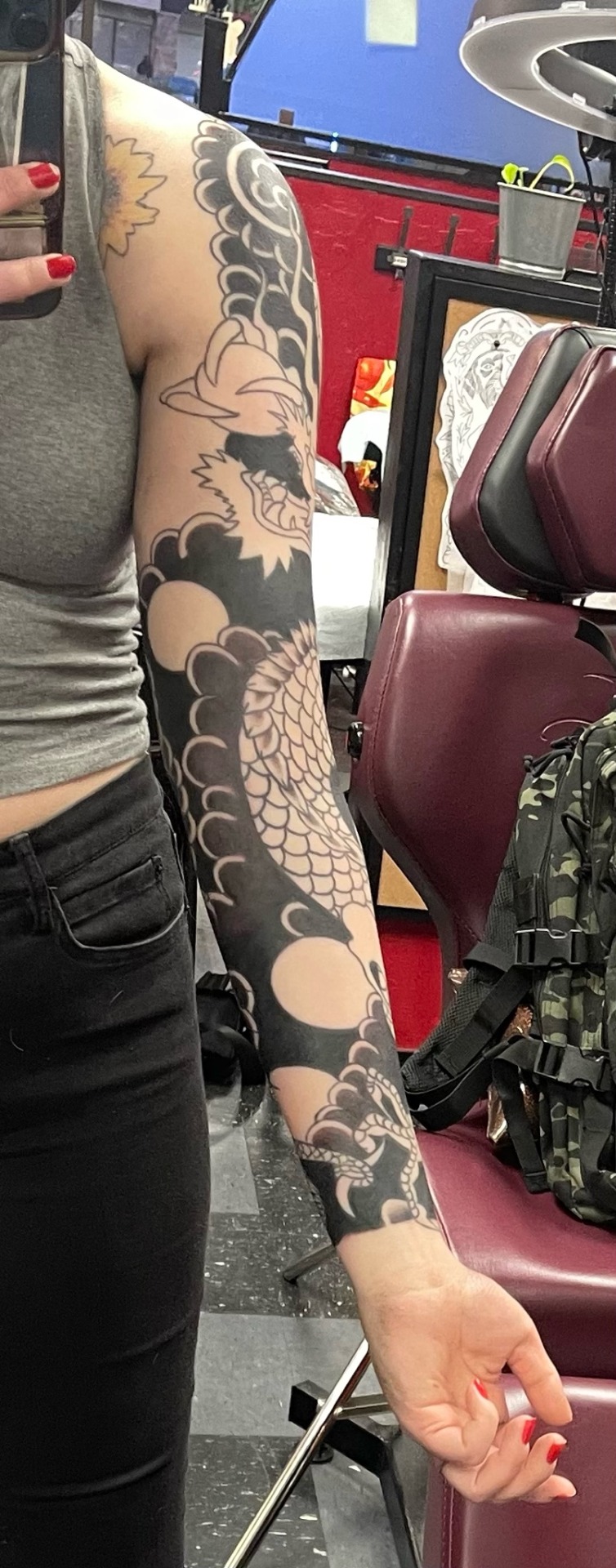
There's a lot more on the back lol
#update#tattoo#girls with tattoos#girls who lift#tattoo sleeve#we love the blackout#good times#happy weekend#I still can't believe I traveled 2000+ miles for this#worth it#anyway#it was such a vibe to be in there#everyone was hyping me up about how I sit and everything#crying#now I could go for a peanut butter cookie#hmmmmm#much to think about#or a Diet Coke#bless#ok#love me#I love yall#be my friend#we can talk tattoos#gonna go eat#later taters#cute girl#hot girl shit#of course
30 notes
·
View notes
Text
hi everyone!
just wanna let y'all know i won't be active from tomorrow until sunday bc i'm traveling abroad to meet my best friend of 6+ years, @bangzchan, for the first time and we're going to meet+see luminous together 🥺😭
i will check my tag #melontrack once i come back, so if there are things you don't want me to miss you can use that 😊🧡
#mel talks#still can not believe this is happening and it's been some weeks to let it sink in but wtf skdjfshjbhersuhiduoflrjfj#meeting viki will be sooo much fun but also i'm nervous bc it's the first time skhskjfkl but aaaahhhhh i can't wait 🥺😭#this will be my first kpop concert btw.. i'm nervous excited anxious hyped sdkhjfdkrjlkl#also meeting lumi will be aaaaahscdkjlkdglk scary but hopefully fun??#i'm also traveling alone for the first time ever.. first by train#and then i will be flying for the very first time.. i'm very anxious but i'm sure it will be fine 😭#see y'all sunday or monday whenever i get back to tumblr again 🧡
46 notes
·
View notes
Text
Steadily breaking in a new sketchbook
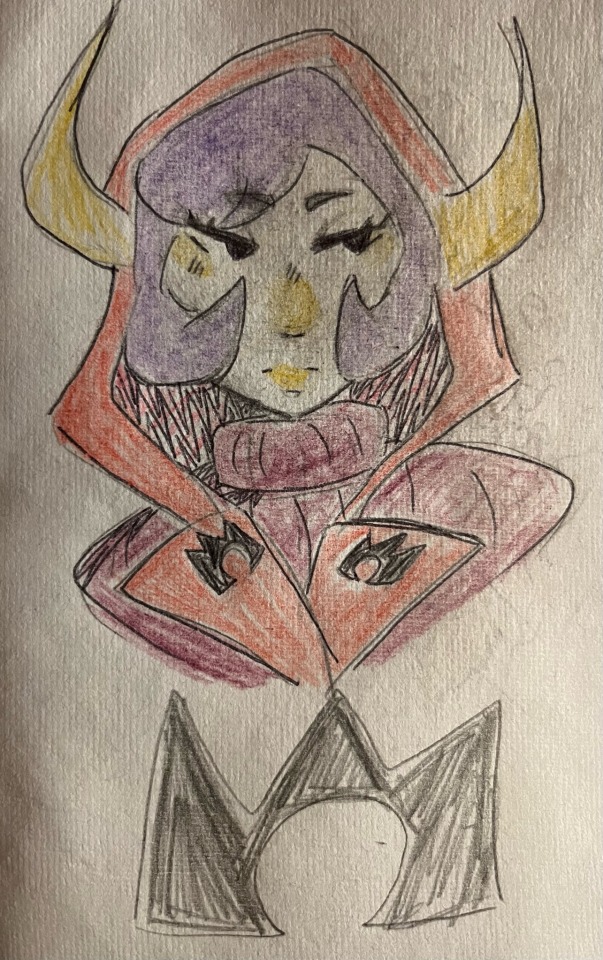
#it’s travel sized! TRAVEL SIZED!#it was also an early birthday present and handmade#yes I am super hyped about it#magma admin courtney#art post#team magma#traditional art
25 notes
·
View notes
Text
wahoo i can’t believe i finally got tickets to a httyd live orchestra after years of waiting like it’s months and months away but i’m literally so excited i could scream
#AND AT THE SYDNEY OPERA HOUSE ….#i’m skipping around and doing parkour#also i can finally get a dragon tattoo from this artist i love who’s based there 😭#it’s literally meant to be guys idk !#jackshiccup text#it’s also gonna b my first time travelling solo which is extra hype
39 notes
·
View notes
Text
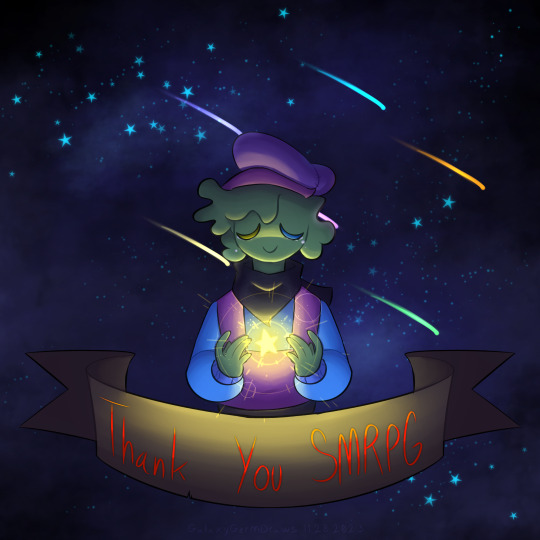
I don't usually post sona related art, but I just beat the SMRPG remake and it made me just. start crying. Like i was just sobbing my way through the end of the game, and my hope for the future of Mario RPGs has never been brighter. So it made me just. Feel a lot of emotions and I didn't really know how else to capture them.
I'm very happy I got to live during a time when this wonderful game got a remake that will be more readily available for people to play. And I am so happy this game was just as good as I have been told it was. Definitely looking forward to replaying it again.
Uh. Yea. Jus kind of a personal piece I 'spose. Bonus little doodle I drew the day before the remake dropped under the cut
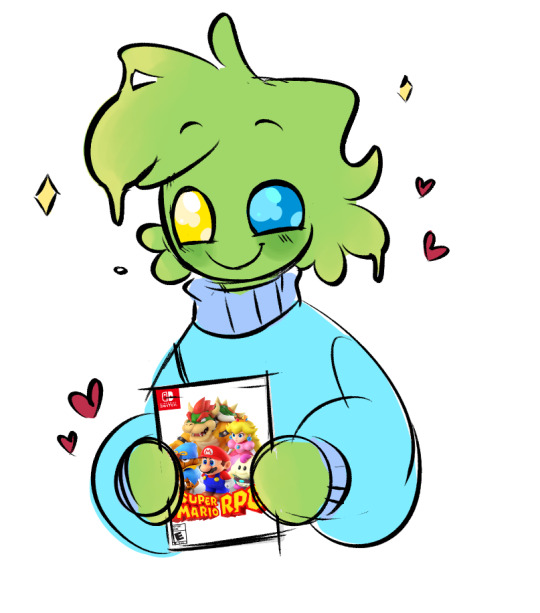
#germdraws#germ draws#goop#sona art#smrpg remake#mostly bc thats what this is talking about#i dont expect this to get notes this was just like. a personal piece about my emotional state today#not too often does a game quite drive me to the point of drawing my emotional state about it#I didnt. expect to cry like a baby over it#i knew id prolly cry. most mario rpgs do make me cry#but i havent cried this hard since i replayed origami king earlier this year#and that was probably bc it was like. the same week as finding out mario was getting a new va#and bc i was witnessing my favorite piece of media travel into a new era#and i am beyond excited#especially because the second major game to kick off said new era....is a game from 1996#a game ive been told about a lot in my life. every other mario rpg that was hyped to me never hit right. ttyd n bis both#i never finished ttyd. bis was rather tiring. maybe ill replay it one day. who knows#but smrpg was. rlly good. i rlly liked it. it made me very happy. i made me very emotional.
23 notes
·
View notes
Text
On my hands and knees begging Bungie to let us alter our Guardian's appearance without having to remake them entirely
#destiny 2#destiny the game#pigeon talks#I was hype to get a new helmetless cutscene this season but then I bore witness to his face#tragic#and I'm not strong enough to delete him and lose the extra fast travel point in Eventide#and redo the new light intro for the 8th time
245 notes
·
View notes
Text

I'm still alive guys work is just ✨busy✨
#fanart#owari no seraph#seraph of the end#shinoa hiiragi#digital art#my art#just doodling some of Yamamoto's col arts in some free time#no time for making up new stuff though TvT#non OnS life update below:#it was Songkran on the 13th#but other than having loads of yummy thai food#I didn't do much to celebrate this year#I've been up and down the UK for work so barely had any time for myself haha#and more work travel again on Friday ahhh#but I've been getting into reading novels a lot more during this time hehe#currently reading ACOTAR (lol ik had to see what the hype was abt)#and my tbr list includes:#the girl who fell beneath the sea - Axie Oh#the kamogawa food detectives - Hisashi Kashiwai#plus a couple danmei books which have too long names XD
9 notes
·
View notes
Text
All the tour groups in Springfield should be very proud of me for how well I refrained from sharing all my fascinating Lincoln facts.
#there were so many school groups!#a giant one came in RIGHT AFTER i entered lincoln's cabinet room#part of me was screaming 'children i NEED to tell you about all these idiots and their insane drama!'#a smarter part of me understood that would be super weird#so instead i regaled different individuals of my own traveling party after we had the room to ourselves#then at lincoln's tomb we lucked out in getting there during the ten minutes of the day when school groups weren't there#which meant we got a personal tour from a guide who seemed thrilled to have grown-ups to talk to#he and my dad chatted about fishing for a long while in the entry#it didn't feel disrespectful because it totally felt like the kind of conversation lincoln would have understood and joined in on#and then we went on our way but the guide then chased us down to share all the fascinating lincoln stories as we went along#(shout-out to lefty you were great)#and then a school group found us so we made a graceful exit#but outside a teacher was explaining to a different group about how robert was significant in his own right so he's buried at arlington#and the RESTRAINT i showed in not immediately informing them that he was present at three presidential assassinations! it was rather heroic#and then when we toured lincoln's house the guide (who accidentally made it clear he was a revolutionary war buff)#(which made it a bit hilarious he was stuck with lincoln)#asked for questions before we started and someone asked about lincoln's 1860 election campaign!#aka one of my SPECIAL NICHE AREAS OF OBSESSION!#you cannot imagine how desperately i wanted to tell him ALL ABOUT seward and thurlow weed#anyway it was fun to go back now that i actually know stuff about lincoln#but it was also a bit frustrating because now i know how much they leave out#(though there was cool new info and artifacts)#(the blood-stained piece of laura keene's dress was very morbid and very cool)#also it reminded me that i still have that book on the 1860 election i've yet to read and the hype is so real#presidential talk
16 notes
·
View notes
Text
thinking more on it and…i think i am on board with percy and annabeth going to college in new rome
like i can see them getting an apartment together there and helping out around the city itself, advocating for higher age requirements to be on the senate and just flipping the whole child soldier thing on its head so children grow up in the city then join the army and senate later on life, maybe they also get like jobs in the city itself like on the side (brings in the other aus: coffee shop, tattoo artist, florist, etc). getting engaged and married bc they’re impulsive and in love and have stared death in the face so they don’t want to waste anymore time (my personal favorite is defending camp and getting impulsively married on the battle field as one of their friends officiates). sally, paul, and little estelle flying out to california to watch annabeth and percy walk across the stage (maybe the chases are there as well idrc) and afterwords it’s similar to percy’s high school graduation where his mom is just nonstop crying and making him tear up more than once. him and annabeth holding their diplomas (marine biology and architecture respectively) with wide smiles in their purple cap and gowns that have golden accents. them moving back to new york where they start their work on camp half blood, creating new athens and strengthening their defenses so greek demigods can have a safe haven just like roman demigods to grow old and have families. moving into their home in montauk that annabeth designed and built that is both parts her and him, a beautiful blend of them. annabeth following her dreams of being an architect, percy staying close to home to watch his sister grow and help marine life/the ocean/nature and doing his part like what pan and grover spoke of and continuing what he’s been doing since he was a teen, helping people/creatures that need help.
#:(#percy jackson#annabeth chase#pjo#percy jackson and the olympians#hoo#heros of olympus#percabeth#headcanon#head canon#hc#i actually like the idea of them going to college in new rome#and them getting married#and living in new york#in their forever home#stopping by camp often as like semi camp cousilors but also not really bc that’s nico and wills job now#but percy being like the cool cousin who stops by every once in a while and everyone gets hype as shit#annabeth being this awesome hero who everyone looks up to and wants to talk to and learn from#them teaching the campers how to fight with weapons#them being like a traveling circus kinda bc everytime they stop by camp they have to spar at least once but the entire camp watches#fanfic#fanfiction
223 notes
·
View notes
Text
maybe i should try unicorn overlord again...
#unicorn overlord#by all accounts i SHOULD love this game.#but idk....#something about some of the character designs doesn't grip me...#and the combat is cool but maybe not my cup of tea....#but everyone else who likes fire emblem or octopath traveler is always hyping it up...#i feel like i'm missing something
7 notes
·
View notes